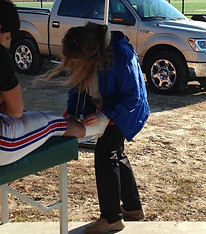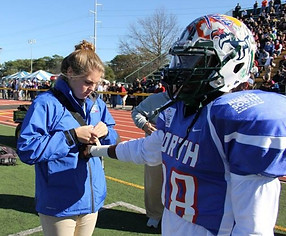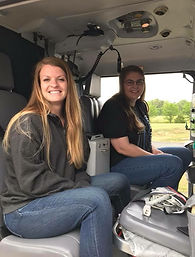Early Exposure
Many young adults do not know what they want to pursue as a future
career and enter college as an undecided major. Approximately
one-third of college students change their major at least once within
three years. Furthermore, one in ten students will change their major
at least twice (Lederman, 2017). Fortunately, I was given early
opportunities to explore the medical field. These opportunities helped
reassure me that nursing was the career I wanted to pursue.
Participating in different clinical experiences as well as exploring
various fields of healthcare beyond the classroom helped me find the area of nursing that intrigues me the most. If more students were given early exposure to career paths as I did, I believe more students would go into college majoring in an area that they enjoy rather than undecided or guessing what profession they should choose.
A psychologist that I studied in my Survey of Developmental Psychology course (PSYC 420) was John Holland. Holland’s theory explains how our culture unconsciously groups themselves into personalities including realistic, investigational, artistic, conventional, enterprising, inspector and social (Department of Justice, n.d.). After taking an online personality test, I was identified as an “inspector.” The inspector is often very keen on their sense of right and wrong in their area of interest. They often feel devoted to and as if they have a duty to their job. They keep their feelings to themselves and work at their highest efficiency with step-by-step approaches. This personality perfectly describes me. I often do not let my feelings intertwine with my schooling or social life; instead, I keep them at home. I work very well in fast-paced environments where there are specific procedures. For example, in an emergency room, there are protocols that you follow for different complaints such as difficulty breathing or chest pain. These are step by step assessments that help you determine the cause of the problem. I also feel as if I have a duty to work as a trauma nurse, a field that many others cannot work in, to help people when they are at their absolute worst and need stabilization. Careers that people with this type of personality are often found in include military, policing, law, and health care. This is very fitting for myself as I want to work in emergency medicine and eventually on trauma helicopters. According to Holland, people with similar personalities tend to work together because they can create a working environment that helps achieve that job’s purpose. People who choose to work in an environment with people who share a similar personality are more likely to be successful and satisfied. Students spend their high school years trying to discover who they are personality-wise and what group of people they are most similar to (Department of Justice, n.d.). I believe that during these years, students should have early exposure to careers. Early exposure will help adolescents learn what types of personalities that they work well with and what environments they prefer before entering college.
The high school that I graduated from has an Applied Careers and Technology Center (ATC), offering a vast amount of health science courses. Many students, like myself, took health science courses because we had the curiosity of going into the medical field. The courses offered while I was in high school were very generic, teaching students basic anatomy and medical terminology. We were not exposed to the variety of fields that nursing has to offer. Early exposure and participation in career areas would help improve students’ future professional inspirations. Over the past few years, ATC has expanded its options for students. Now they offer Emergency Medical Technicians and Certified Nursing Assistant courses. Through these courses, students are given opportunities to do clinical hours as well as taking a certification exam at the end of the school year. ATC also hosts a realistic car crash scene every semester so students can observe how units such as EMS, police, fire, coroners, and medical helicopter crews work together in medical emergencies. Giving students the opportunity to explore and participate in options as mentioned above will help a student know whether or not those fields of healthcare are of interest to them. These are opportunities I was not fortunate to have, but through college, I have been fortunate to gain experiences that have helped me decide that emergency nursing is the profession that I was meant to pursue.
When I was a freshman and sophomore in college, I volunteered as a student athletic trainer at a local high school. Through this experience, I assisted with taping and rehabilitating athletic injuries. I was exposed to an array of injuries from sprained muscles to open fractures. I had to learn how to stabilize injuries as well as work closely with the EMS team to ensure the athletes were cared for properly until they were taken to the hospital. I fell in love with the fast-paced, high adrenaline environment that sports medicine offered. This experience helped me to understand that my passion was in emergency medicine. I knew when entering nursing school that I wanted to work in a field where I worked with more serious, acute injuries and work with a team to stabilize injuries, such as the emergency department.
Exposure to different areas of nursing has been beneficial to me in considering my future. For example, pediatrics has never been an area of nursing that interested me. As a junior in USC’s nursing program, I was required to take a Nursing of Children and Families (NURS 425) course. For the clinical portion of the course, I spent two days in a pediatric hospital, caring for children and adolescents, as well as spending a day with a school nurse. To my disbelief, I enjoyed being able to not only care for the children but also being an advocate for the patient and their family. During downtime, I could take the children to the playroom or even downstairs to get a face painting or do a craft. Though it is sad and hard for children to be sick in the hospital, I was able to experience how a nurse could make that child’s stay more positive. Without this experience, I may have avoided working with children completely. When I was working with a school nurse, I noticed that the nurse was very protective of her students and became their advocate. The students knew how much the nurse cared for them and were very respectful and loved to speak with the nurse about their day. Something as simple as following a school nurse for the day allowed me to differentiate from the boring school nurse stereotype and see what a day in their life encompasses.
Another unforgettable experience I had was arranged
by Dr. Robin Estrada, faculty of USC CON.
Dr. Estrada planned a field trip to tour
the MedCenter Air flight hangers in Rock Hill, SC. I
loved exploring the helicopters and learning about
what the flight nurses do during a shift. After the field
trip, I emailed the Flight nurse about other opportunities
I could pursue to explore this field of nursing. Over
the next year, I sat in on Flight Nurse Certification
Training courses and did ride along shifts with the
MedCenter Air station in CMC Main. During my
observer shift, I went with the EMT’s and paramedics
to transport more stable clients because there was
nothing serious during the day. During shift change,
when I was about to leave, a pilot came over the radio that he was going to pick up a gunshot victim and bring him to CMC main. I was allowed to stay until the helicopter arrived and help transport him into the trauma unit to transfer his equipment over and into the operating room. This was the most fantastic experience I have ever had. I loved the feeling of adrenaline rushing. I often second-guessed if I could personally handle the vast amounts of blood and the possible emotions that come with trauma, but after this night I was sure that I wanted to work with more serious injuries rather than on a general medical-surgical unit.
Lastly, USC Lancaster hosts an annual Honors Day. This is when high school Honor Society students in surrounding counties come to campus to explore degree areas offered at USCL. I have volunteered for the past two years to help run the Nursing Simulation Lab. I would provide care for a manikin who was in pain and able to speak and answer questions, as well as helping our mother manikin deliver her baby. High school students can come into the Simulation Lab and interact with the nursing students and learn some of what being a nurse encompasses. Through this opportunity, we can expose these students early to the many different areas of nursing through simulation demonstrations, handouts, and speeches. This is one of the opportunities that many students are not fortunate to participate in unless they are in the Honors Society. More opportunities should be offered for other high school students regardless of whether they are honors students.
Exposing high school students to areas of health care could help educate them on what the medical field has to offer. They could discover early whether or not a nursing career is right for them, and determine what area is of their interest. I found what areas of nursing I genuinely enjoyed by being involved in clinical as well as out-of-classroom volunteer opportunities. I was lucky to have gone straight into college knowing that I wanted to become a nurse. I have a close friend who has changed her degree path twice until she discovered she wanted to become a nurse. She has spent many extra years in college, and she is now having to pay for it and will graduate with student loans. Exposure to career opportunities in high school will help these students know what they want to major in while in college and have fewer students going into freshman year indecisive.





Above is a photo of the Charlotte, NC skyline from the roof top of Charolina's Medical Center Main helicopter pad. I took this photo while the team and I waited for the helicopter to land with the critical patient.
The photo to the right and below are pictures of myself taping athletes at the South Carolina North-South Allstar Football Game.
The photo to the left is a photo I took of the MedCenter Air helicopter after it had landed. The patient had been taken into the operating room and I was going to help clean the helicopter before they took off to their headquarters.
To the right is a photo of my classmate Maleah and I sitting inside the MedCenter Air helicopters during our flight hanger tour. I was sitting in the nurse's seat and Maleah was sitting in the respiratory therapist seat (over top of the patient's head).
Artifacts
In psychology, I have learned about numerous psychologists. The document above are notes I saved about John Holland. I speak about John Holland's theory in my key insight above but these notes go a little more in detail with personality descriptions.
Above is the email I got in return confirming my observer shift with MedCenter Air. I speak about MedCenter Air in my insight and how this observer experience exposed me to trauma and helped me confirm my passion for trauma nursing.
Above are some notes that I took when I went to tour the MedCenter Air Rock Hill flight hanger. We got to experience one of the courses that flight nurses get the opportunity to take. I really enjoyed learning about the major concepts that flight nurses must learn and know well. I loved to learn about how to treat more severe trauma and would love to do it myself one day.
References:
Department of Justice. (n.d). Basic skills curriculum: The career theory of John Holland. National Institute of Corrections. 1-19. Retrieved from https://www.ncda.org/aws/NCDA/asset_manager/get_file/72088
Lederman, D. (2017). Who changes majors: Not who you think. Retrieved from https://www.insidehighered.com/news/2017/12/08/nearly-third-students-change-major-within-three-years-math-majors-most